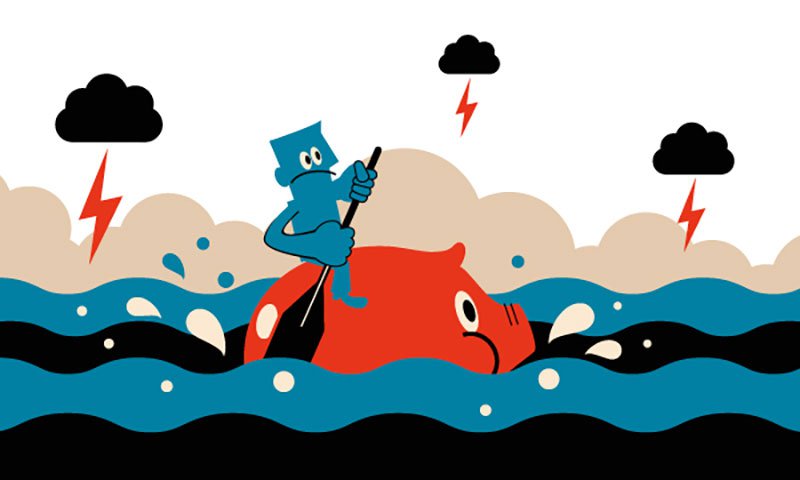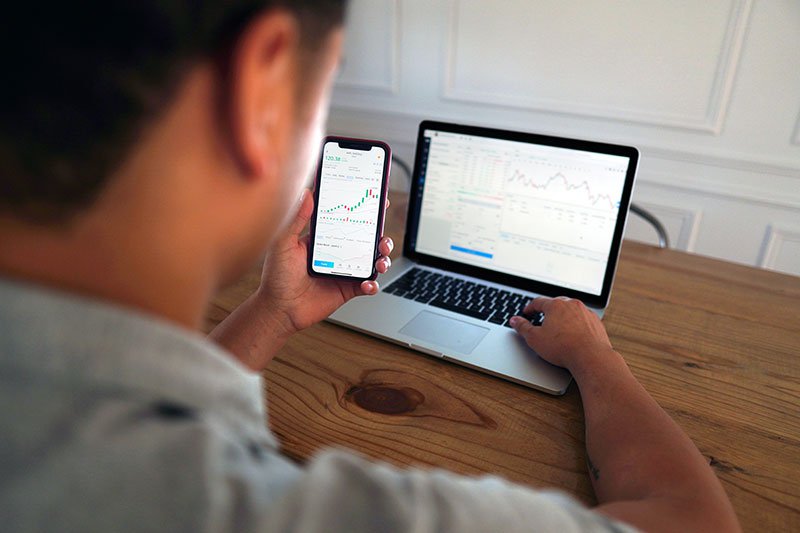MAS's new Senior Growth Manager of Investments, Jules Riley, explains how to weather financial storms and come out on track.

There's war in Europe, oil prices rose briefly above US$130/barrel, inflation is at 30-year highs, interest rates are rising and house prices are falling. With all these attention-grabbing headlines, you'd be forgiven for worrying about how your investments are performing.
So what should you do? Perhaps nothing, but maybe something.
Firstly, we've been here before. Think Black Tuesday in 1987, the dot-com bubble of 2002 or the global financial crisis and oil price boom and bust of 2008. You get the picture. The world is never short of troubled times, but nonetheless, share markets have historically continued their rise, albeit with plenty of bumps along the way.
But instead of just saying 'hold on for dear life' or 'buy the dip', let's not ignore these bumps either, as depending on when they occur in your lifetime, they can be an opportunity or a catastrophe. While it's true that there's been no 20-year period in 150 years of US share market history in which you would have lost money, this hasn't been the case everywhere. People often overlook the fact that other major countries' share markets collapsed and were forcibly closed for years during this period - for example, Germany and Japan after WW2.
So, while 'buy and hold' is still a legitimate investment strategy in the right circumstances, let's give it some wider perspective.
1. Protect yourself from unacceptable losses
How would you and your family cope if you lost your job, died or became too sick to work? Those are the kinds of essential questions to ask before worrying too much about your investment strategy.

According to Te Ara Ahunga Ora Retirement Commission, 44% of Kiwis only have enough savings to cover one month or less if they lost their income. So if you don't have one, consider putting together an emergency fund of roughly three to six months' worth of spending and then prioritise paying off debt, especially high-interest debt like credit cards and personal loans.
Also ensure you're well insured with life insurance (if you have dependents or a mortgage), income insurance and/or trauma insurance (to protect your biggest asset - your income) and general insurance to protect the things you can't afford to replace, like your home and car.
2. Come up with an investment plan
Once you've covered your downsides, you can experience the ups and downs of investment markets with a lot more confidence. That said, to improve your outcomes, it's best to have a plan. And to have a plan, you need a goal. Let's start with your KiwiSaver account, as almost everyone has one and it's a good first step.
There are generally two possible goals for your KiwiSaver account: buying your first home or saving for your retirement. That's it. Once you know what your goal is, you can set an investment timeframe. For example, you're 25 and want to buy your first house at 30: your investment timeframe is five years. Forty years old and already have a house? Your goal is your retirement, and your investment timeframe is at least 25 years.

This clarity is empowering as it helps you decide which sort of fund you should be in. As a very general rule, if your investment timeframe is more than ten years, consider a growth or aggressive fund, if it's five to ten years, consider a balanced fund, and if it's less than five years, consider a conservative or defensive fund.
The other key consideration for choosing a fund is your risk tolerance, which is, as the saying goes, 'the balance between getting rich and getting sleep'.
This is personal and it's important to get this right so your emotions don't overcome your logic in times of volatility. To work out your own relationship to risk, head to Sorted and try their Investor Kickstarter tool.
Now you can essentially repeat these steps for your other investments and goals. For example, saving for a car in two years? Cash or term deposits may be appropriate. Your baby's first home fund? A growth or aggressive fund in a KiwiSaver scheme could work well for you. Buying a rental property? Ensure you don't need the money back for at least five years so you can ride any bumps along the way.
The other essential factor to consider when you're building your investment plan is that nothing can replace good diversification. According to the Reserve Bank, New Zealanders have invested around $87 billion in KiwiSaver schemes but over $1.5 trillion in residential property – over 17 times more. One house on one street in one city in one country is not particularly good diversification, but it is what we do.
Funds in KiwiSaver schemes on the other hand typically invest in hundreds of different assets in dozens of different countries. This protects you from any one asset (such as A2 Milk shares, which have fallen over by 70% since 2020) or any one country (such as Russia where share prices plummeted following the invasion of Ukraine) from wiping you out.
3. Stick with your plan
Psychologically, financial losses affect us so much more than gains, which is why we tend to lock in our losses and sell when everyone else is selling. Conversely, the fear of missing out causes us to want to buy when everyone else is buying, pushing us to get in on the action, even though the party might be about to end.
One way to fix this is to take steps to remove your emotions from your investing. For example, you could set up an automatic payment to your investment account on the day you're paid, only invest what you're comfortable with and then forget about it, only reviewing your plan and performance once a year.
Another way is to work with a financial adviser. MAS has more than 50 commission-free financial advisers around Aotearoa and they're here for your benefit. Using an adviser puts an expert in between you and your money, providing you with a calm voice of reason during uncertain times.

The storm will pass
Like all crises in history, these storms will pass and be replaced by good times and bad. What's important is that you build a strong vessel to carry you through any weather and to know where you're going, so even if you're blown off course, you can get back on track again.
This article provides general information only and is not intended to constitute financial advice.
Medical Funds Management Limited is the issuer and manager of the MAS KiwiSaver Scheme.
The Product Disclosure Statement for the MAS KiwiSaver Scheme is available here.
Know someone who might enjoy this?
Read this next
-
March 2022
Taking an active approach to investing
Money
See all-
March 2021
Reimagining the Kiwi homeownership dream
-
March 2022
Taking an active approach to investing
-
July 2022
The Curve: Raising financial literacy





